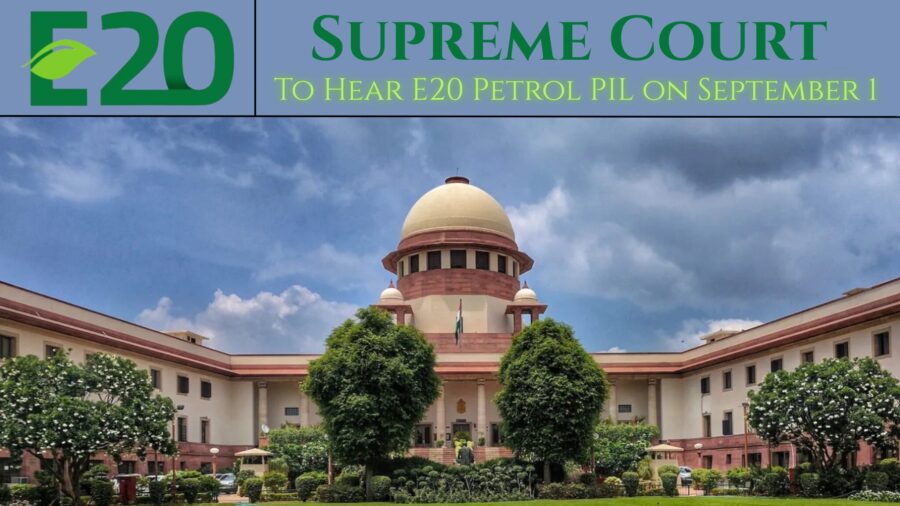Quick Take – 4 Key Points
- Hearing Date: September 1, 2025 – Supreme Court to examine challenges to India’s E20 petrol policy.
- Main Demand: Keep ethanol-free petrol (E0) available alongside E20 and ensure proper fuel labelling.
- Consumer Worries: Compatibility issues, reduced mileage, and higher upkeep for older vehicles.
- Citizen Insight: Independent fuel checks reveal big differences in ethanol content across brands.
Introduction – A Roadblock on India’s Green Drive
India’s fuel mix is changing fast. To cut oil imports and reduce emissions, the government has made 20% ethanol blending (E20) in petrol mandatory. On paper, it looks like a step toward cleaner mobility. But for millions of vehicle owners, the policy has sparked a wave of concern.
These concerns have now landed in the Supreme Court, with a PIL filed by Advocate Akshay Malhotra. The case will be heard on September 1, 2025, by a bench led by Chief Justice BR Gavai, alongside Justices K Vinod Chandran and NV Anjaria. The outcome could shape how India balances its green fuel ambitions with the everyday realities of drivers.
Why the Policy is Being Challenged
The PIL doesn’t reject ethanol outright. Instead, it asks a simple question: why remove choice?
While newer vehicles are being designed to run on higher ethanol blends, millions of cars and two-wheelers on Indian roads weren’t built for it. For them, E20 isn’t just a change — it’s a risk.
- What motorists fear most:
- Corrosion of fuel system parts.
- Lower mileage compared to regular petrol.
- More frequent repairs and higher long-term costs.
The PIL therefore urges the court to direct oil companies to continue selling ethanol-free petrol (E0) alongside E20, giving consumers the freedom to choose what suits their vehicles.
Citizen Experiments Expose Fuel Gaps
Interestingly, this issue gained traction not just through official data, but from on-ground citizen testing.
A Reddit user from Karnataka, known as KingsmanVishnu, tested petrol from pumps of IOCL, HP, BPCL, Nayara, and MRPL. The results showed:
- IOCL, HP, BPCL (Regular variants) and MRPL fuel – 14–15% ethanol
- BPCL Speed 95 – just 4–5% ethanol
- Nayara petrol – 6–8% ethanol
The surprising part? Nayara’s lower-ethanol fuel felt smoother on engines, even though it’s not sold as premium petrol. While these aren’t lab-certified results, they underline a key problem — a lack of transparency. Right now, most consumers have no idea how much ethanol they’re putting into their tanks.
What the Court’s Verdict Could Mean
The stakes are high, not just for the government but for every motorist.
If the Supreme Court sides with the PIL, it could mean:
- Petrol pumps must stock both E0 and E20 fuels.
- Clear labelling of ethanol content becomes mandatory.
- Consumers get freedom of choice depending on their vehicle’s age and compatibility.
But if the court upholds the existing mandate without changes, then E20 will roll out nationwide at full speed. While this helps the government’s goals of reducing imports and supporting farmers, it might also leave older vehicle owners struggling with higher costs and maintenance headaches.
Conclusion – The Road Ahead
The E20 petrol policy was meant to accelerate India’s shift toward greener fuels. But as this PIL shows, big-picture goals can clash with ground-level realities. Millions of vehicles still on the road today weren’t built with ethanol in mind.
The September 1 hearing isn’t just about fuel blends — it’s about trust, transparency, and choice. Whether the Supreme Court orders a rethink or clears the policy as is, its verdict will shape how India balances climate responsibility with consumer fairness.
Check out –

